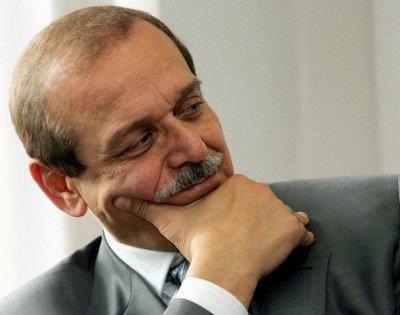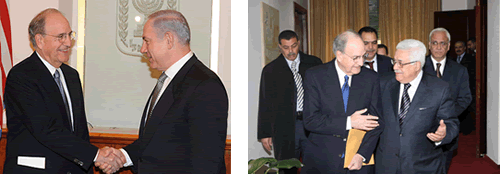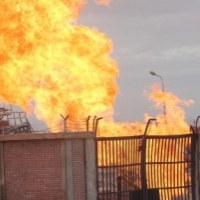![]()
Wed, December 15, 2010 | The Meir Amit Intelligence and Terrorism Information Center

File picture taken on September 8, 2004 shows senior Palestinian Authority official Yasser Abed Rabbo during a meeting of the Geneva Initiative Network for Middle East peace at the Swiss Mission to the European Union in Brussels. (Getty Images)
PLO Secretary Yasser Abd Rabbo: Negotiations Are “a Useless Political Process”
Secretary of State Clinton’s Announcement and Israeli and Palestinian Responses
Following the stalemate in the negotiations and the intransigence of both sides, American Secretary of State Hillary Clinton, speaking at the Seventh Annual Forum of the Brooking Institution’s Saban Center for Middle East Policy, said it was “time to grapple with the core issues of the conflict on borders and security; settlements, water and refugees; and on Jerusalem itself,” and that the parties had “indicated that they want the United States to continue its efforts. And in the days ahead, our discussions with both sides will be substantive two-way conversations with an eye toward making real progress in the next few months on the key questions of an eventual framework agreement…”[1] (American State Department website, December 10, 2010). State department spokesman Philip Crowley said that the United States had decided to stop pressuring Israel regarding the construction freeze at this point, but that the United States still regarded the settlements as illegal (State department website, December 8, 2010).
Israeli Prime Minister Benyamin Netanyahu, meeting with George Mitchell, the American envoy to the Middle East, said that a new way had to be found to achieve the joint goal of “a framework agreement for peace that will ensure both peace and security.” He called it “a worthy objective” and said that he knew ” that the United States Administration, the President, the Secretary of State and [George Mitchell] are committed to it, as we are and we hope our Palestinian neighbors will participate with us to achieve that…”[2] (Israeli Prime Minister’s website, December 13, 2010).

Left: Israeli Prime Minister Benyamin Netanyahu and George Mitchell, the American envoy to the Middle East (Israeli Government Press Office, December 13, 2010). Right: Palestinian Authority Chairman Mahmoud Abbas with Mitchell (Wafa News Agency, December 14, 2010).
Spokesmen for the Palestinian Authority said they were disappointed by the secretary of state’s announcement and expressed a lack of faith in the ability of American mediation to resolve the conflict:
— Nimr Hamad, Mahmoud Abbas’ political advisor, claimed that the Palestinian Authority did not know what the nature of the new American effort would be, especially after it had become clear that “the United States is not capable of exerting pressure on Israel to achieve…a three-month freeze.” He added that Europe was also disappointed by the American position. He said that the problem with the negotiations was “the lack of a honest broker who would exert pressure on Israel” (Al-Jazeera TV, December 11, 2010).
— Yasser Abd Rabbo, secretary of the PLO’s executive committee, claimed that Clinton’s speech was a repetition of familiar American positions. He claimed that negotiations between “occupier” and “occupied” were “a useless political process.” He said that the conflict would only be resolved following “coercive, active” international intervention (Wafa News Agency, December 11, 2010).
— Jamal Muheisen, a member of Fatah’s central committee, said he doubted the United States had the ability to force Israel to reach a peace agreement. He said that the Palestinian leadership had rejected the American offer to mediate indirect negotiations with Israel, and that the Palestinians intended to appeal to the UN Security Council in light of the “American failure” (Al-Quds Al-Arabi, December 13, 2010).
Salah al-Bardawil, a member of Hamas’ political bureau, called on the Palestinian Authority “to stop the talks with the Americans” and to end the security coordination with Israel following the “American rejection of the Palestinians’ most basic rights.” He accused Secretary of State Clinton of “misleading” the PLO, saying that the United States had been exposed as an “enemy,” not a “friend” of the Palestinians (Al-Bayan Center website, December 11, 2010).
Announcement of the European Union Council
The European Union Council expressed regret at Israel’s decision not to extend the construction freeze in the settlements. It called for the “immediate” lifting of the so-called “siege” of the Gaza Strip, but congratulated the Israeli Cabinet for making exports from the Gaza Strip possible (see below). The Council also called for the release of abducted Israeli soldier Gilad Shalit [three and a half years since his abduction] and for an end to the rocket fire from the Gaza Strip.
It expressed the willingness of the European Union to help reach a negotiated solution for the conflict during the coming year and called on the sides not to undertake “hasty” unilateral action. According to the announcement “The EU will not recognize any changes to the pre-1967 borders, including with regard to Jerusalem, other than those agreed by the parties…A negotiated settlement must allow the two States to live side by side in peace and security.” However, the Council would be willing to recognize a Palestinian state “when appropriate”[3] (European Union Council website, December 13, 2010).
Continuing Palestinian Action for the Recognition of a Palestinian State
The Palestinians continue their international activities to achieve broad recognition for a Palestinian state with the 1967 borders. The Arab League issued a press release congratulating the Palestinians on receiving recognition from Brazil, and called on the international community to follow in its footsteps (Al-Hayat Al-Jadeeda, December 6, 2010).
Taysir Khaled, a member of the PLO’s executive committee, denounced the American criticism of the Latin American countries’ recognition of a Palestinian state, claiming that it showed “the United States is plotting with Israel” to prevent other countries from recognizing it. He claimed that now was the time for the Palestinians to declare their independence and appeal to the international community and the UN with a call for them to recognize a Palestinian state whose capital was East Jerusalem (Wafa News Agency, December 11, 2010). Ahmed al-Majdalani, a member of the PLO’s executive committee, said that the process would “continue with other states in Africa and Europe” (Chinese News Agency, December 11, 2010).
Notes:
[1] CrethiPlethi.com; Dec 11, 2010.
[2] Prime minister’s Office.
[3] Consilium.Europa.eu.



 RSS
RSS










PLO Secretary Yasser Abd Rabbo: "Negotiations Are a Useless Political Process" | #Israel #PLO #Peace #Palestine http://j.mp/eRezq5
RT @CrethiPlethi: PLO Secretary Yasser Abd Rabbo: "Negotiations Are a Useless Political Process"http://j.mp/eRezq5